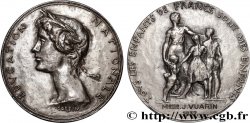E-auction 353-267195 - fme_470043 - III REPUBLIC Médaille commémorative interalliée de la Victoire, Grande Guerre 1914-1918
得先注册又得到批准才可以报价。为了报价注册. 客户应该得到公司允许,那种过程需要 48 个小时。别等出售结束那一天才登记。您报价的话等于您赞成买那物品,而且按« 保价 » 证明您接受 cgb.fr 因特网拍卖使用法.
报价时只可以出全数值欧元总额。物品描述也说明销售结束时间,结束后出价都不会生效。 报价命令转达有时变动,等到最后秒钟增加否决的可能会。想多了解的话请注意 因特网拍卖常问
购货人不付费
购货人不付费
| 估算 : | 25 € |
| 价格 : | 15 € |
| 最高出价 : | 15 € |
| 拍卖结束日期 : | 20 January 2020 18:37:30 |
| 竞拍人 : | 4 竞拍人 |
种类 Médaille commémorative interalliée de la Victoire, Grande Guerre 1914-1918
日期: n.d.
材质 bronze
直径 35,04 mm
模子方针 12 h.
重量 19,93 g.
侧面 fines rayures horizontales
印模 corne BR
关于品相的说明
Patine hétérogène. Petite usure sur les hauts reliefs
正面
正面的文字 ANÉPIGRAPHE.
正面的说明书 Victoire ailée et laurée, drapée à l’antique, portant l’épée à droite et tenant dans chaque main tendue des couronnes de lauriers ; Nom du graveur en bas à droite : A. MORLON.
背面
背面的文字 R - F / LA / GRANDE GVERRE / POVR LA / CIVILISATION / 1914-1918 / -.
背面的说明书 Inscription en 6 lignes, avec un bonnet phrygien et couronne civique entre les deux lettres RF. Poinçon (corne) BR à l’exergue.
评论
Cette médaille, dite “médaille de la Victoire”, a été créée suite à la loi du 20 juillet 1922. Elle concerne tous les militaires ayant servi trois mois entre le 2 août 1914 et le 11 novembre 1918 dans la zone des armées.
Par ailleurs, l'article 10 de la loi de 1920 précise que : Le droit de la médaille est également acquis aux militaires qui ont été tués à l’ennemi ou qui sont morts des suites de blessure de guerre (…) et à ceux qui sont morts de maladies ou blessures contractées en service.
La médaille avait été réclamée par le maréchal Foch, commandant en chef des troupes alliées à la fin de la guerre, qui avait proposé la création d’une médaille commémorative commune à toutes les Nations belligérantes alliées.
(source : Wikipedia).
Par ailleurs, l'article 10 de la loi de 1920 précise que : Le droit de la médaille est également acquis aux militaires qui ont été tués à l’ennemi ou qui sont morts des suites de blessure de guerre (…) et à ceux qui sont morts de maladies ou blessures contractées en service.
La médaille avait été réclamée par le maréchal Foch, commandant en chef des troupes alliées à la fin de la guerre, qui avait proposé la création d’une médaille commémorative commune à toutes les Nations belligérantes alliées.
(source : Wikipedia).








 对产品描述纠错
对产品描述纠错 打印
打印 分享我的选择
分享我的选择 提问
提问 Consign / sell
Consign / sell
 产品介绍
产品介绍



